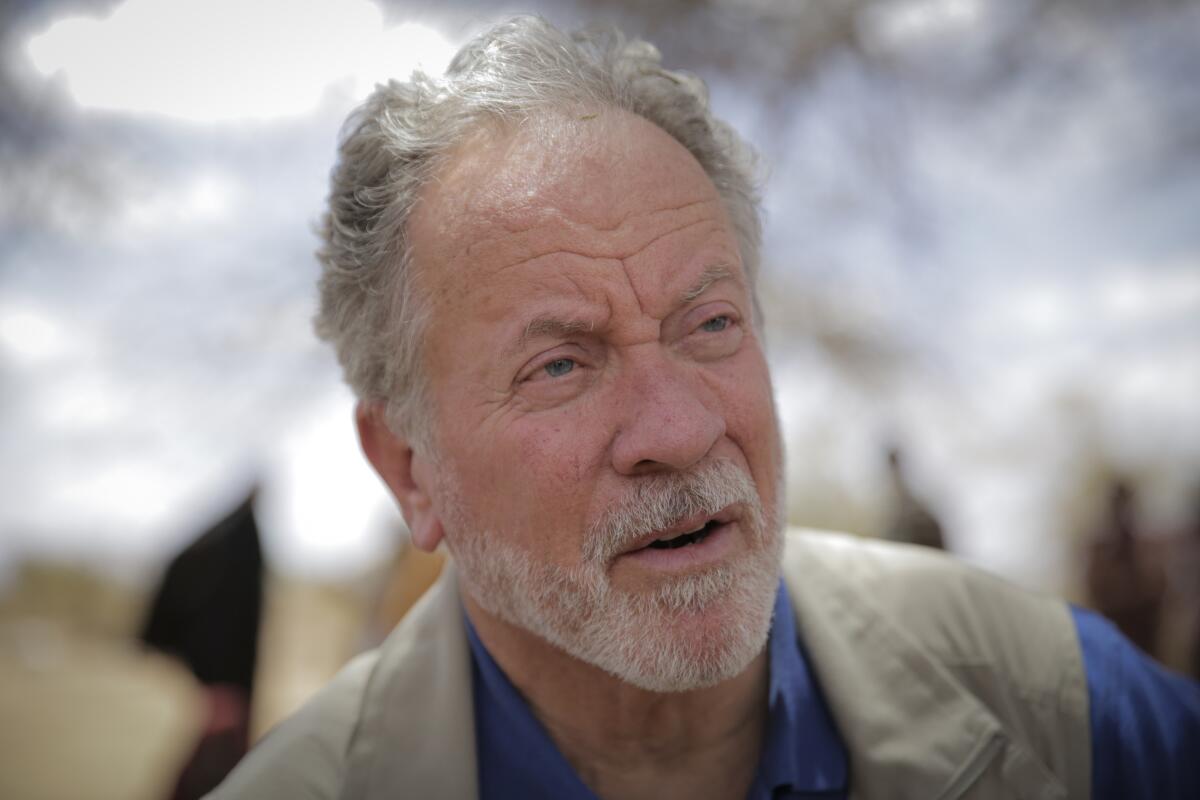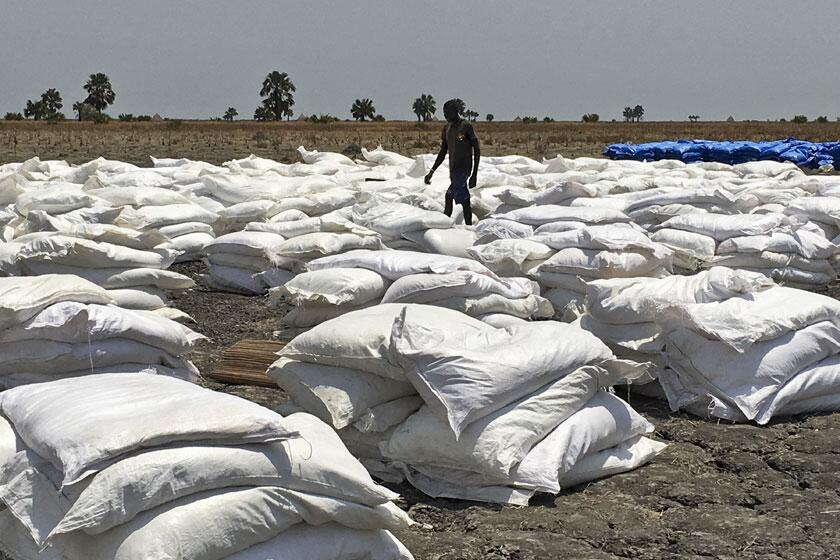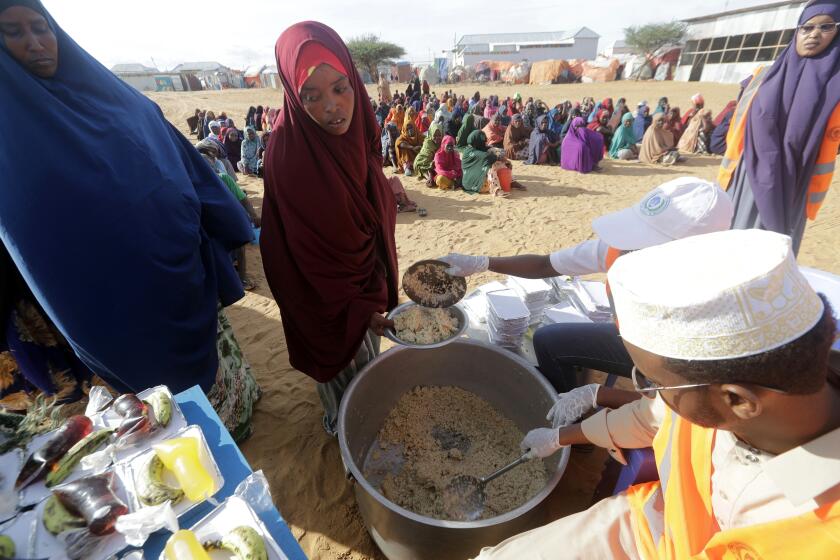U.N. food chief says nations and billionaires need to step up to avert starvation, unrest

- Share via
UNITED NATIONS — Without billions of dollars more to feed millions of hungry people, the world will see mass migration, destabilized countries and starving children and adults in the next 12 to 18 months, the head of the Nobel Prize-winning United Nations World Food Program warned Friday.
David Beasley praised increased funding from the United States and Germany last year, and urged China, Gulf nations, billionaires and other countries “to step up big time.”
In an interview before he hands the reins of the world’s largest humanitarian organization to U.S. Ambassador Cindy McCain, the former South Carolina governor said he’s “extremely worried” that WFP won’t raise about $23 billion it needs this year to help millions of needy people.
“Right at this stage, I’ll be surprised if we get 40% of it, quite frankly,” he said.
Last year, Beasley raised $14.2 billion for WFP, more than double the $6 billion in 2017, the year he took over as executive director. That money helped more than 128 million people in more than 120 countries and territories.
Beasley said he was able to convince the United States last year to increase its funding from about $3.5 billion to $7.4 billion and Germany to raise its contribution from $350 million a few years ago to $1.7 billion, but he doesn’t think they’ll do it again this year.
Other countries need to step up now, he said, starting with China, the world’s second-largest economy, which gave WFP just $11 million last year.
Beasley applauded China for its success in substantially reducing hunger and poverty at home, but said it gave less than one cent per person last year compared with the United States, the world’s leading economy, which gave about $22 per person.
China needs “to engage in the multilateral world” and be willing to provide help that is critical, he said. “They have a moral obligation to do so.”
The United Nations’ World Food Program has been awarded the 2020 Nobel Peace Prize for its efforts to combat hunger across the globe.
Beasley said they’ve done “an incredible job of feeding their people,” and “now we need their help in other parts of the world” on how they did it, particularly in poorer countries including in Africa.
With high oil prices Gulf countries can also do more, especially Muslim nations that have relations with countries in east Africa, the Sahara and elsewhere in the Middle East, he said, expressing hope they will increase contributions.
Beasley said the wealthiest billionaires made unprecedented profits during the COVID-19 pandemic, and “it’s not too much to ask some of the multibillionaires to step up and help us in the short-term crisis,” even though charity isn’t a long-term solution to the food crisis.
In the long term, he said what he’d really like to see is billionaires using their experience and success to engage “in the world’s greatest need — and that is food on the planet to feed 8 billion people.”
“The world has to understand that the next 12 to 18 months is critical, and if we back off the funding, you will have mass migration, and you will have destabilization of nations and that will all be on top of starvation among children and people around the world,” he warned.
The holy month of Ramadan coincides with the longest drought on record in Somalia, leaving many Muslims struggling to break their fasts.
Beasley said WFP was just forced to cut rations by 50% to 4 million people in Afghanistan, and “these are people who are knocking on famine’s door now.”
“We don’t have enough money just to reach the most vulnerable people now,” he said. “So we are in a crisis over the cliff stage right now, where we literally could have hell on Earth if we’re not very careful.”
Beasley said he’s been telling leaders in the West and Europe that while they’re focusing everything on Ukraine and Russia, “you better well not forget about what’s south and southeast of you because I can assure you it is coming your way if you don’t pay attention and get on top of it.”
With $400 trillion worth of wealth on the planet, he said, there’s no reason for any child to die of starvation.
The WFP executive director said leaders have to prioritize the humanitarian needs that are going to have the greatest effect on stability in societies around the world.
He singled out several priority places — Africa’s Sahel region as well as the east including Somalia, northern Kenya, South Sudan and Ethiopia; Syria, which is having an effect on Jordan and Lebanon; and Central and South America, where the number of people migrating to the United States is now five times what it was a year and a half ago.
Beasley said McCain, the widow of U.S. Senator John McCain from Arizona who has been the U.S. ambassador to Rome-based WFP and the U.N. Food and Agriculture Organization, “is the right person at the right time” to lead the World Food Program.
They’ve been working together to make sure “she hits the ground running,” he said, But “it’s going to be a very, very challenging time” because of all the money going to the war in Ukraine, and the need to help so many other fragile economies.
Beasley said his biggest surprise was believing in April 2017, when he took over the agency and there were 80 million people in the world “marching to starvation,” that “we could end world hunger and put the World Food Program out of business.”
What he didn’t expect were the conflicts and wars, the climate shocks, the COVID-19 pandemic and the Ukraine war, he said, which raised the 80 million in desperate need of food to 135 million right before COVID started spreading in early 2020, to 276 million before Russia invaded Ukraine — “the bread basket of the world” — in February 2022, and to 350 million now.
Beasley said “”it’s hard not to get depressed,” but two things give him hope.
Seeing little girls and boys smiling in the midst of war and suffering from hunger “inspires you not to give up,” he said, as does the bipartisan support in the often divided U.S. Congress for helping the poorest of the poor around the world.
As he returns to his family in South Carolina, Beasley said his dream remains to end world hunger.
More to Read
Sign up for Essential California
The most important California stories and recommendations in your inbox every morning.
You may occasionally receive promotional content from the Los Angeles Times.















